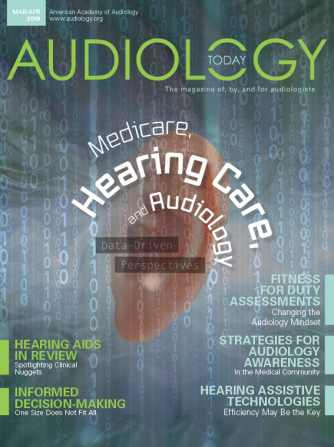
The editorial team and I are so happy to announce the content for this latest issue of Audiology Today. We are featuring a number of comprehensive, relevant, and interesting articles, as well as some short reads on public relations, coding and reimbursement, and audiology advocacy.
Take a look at the table of contents and delve into these online articles, which you can now easily search by topic, title, or author. We appreciate your patience as we continue to upload back issue content, but hope you find this new format easy to explore.
-
- Medicare, Hearing Care, and Audiology: Data-Driven Perspectives By Ian M. Windmill and Barry A. Freeman
-
- Spotlighting Clinical Nuggets in the Upcoming Hearing Aids in Review By H. Gustav Mueller, Catherine Palmer, and Robert Turner
-
- Informed Decision-Making: When One Size Doesn’t Fit All By Katie Oestreich
-
- Fitness for Duty Assessments for Jobs: Audiology Mindset (Part 1 of 2) By Sigfrid D. Soli, Ross Roeser, and Veronique Vaillancourt
-
- Strategies for Increasing Medical Community Awareness of Audiology By Don Nielsen and David Fabry
-
- Increasing Hearing Assistance Technology (HAT) Awareness By John Greer Clark and Brittany Gilb
Erin Schafer, PhD, is the editor-in-chief of Audiology Today and www.audiology.org.
Related Posts
Havana Syndrome Sparks Debate Among Experts
Audio-vestibular symptoms are gaining national attention and sparking debate amongst professionals and the public. A CBS 60 Minute report on Sunday, March 31, revisited Havana…
ADHD in Children in the United States
Audiologists sometimes see patients who also present with a diagnosis of attention-deficit/hyperactivity disorder (ADHD). Reuben and Elgaddal (2024) reported the percentage of children in the…
Remote Diagnostic Hearing Assessment in School-Entry-Aged Children
Even before the COVID-19 pandemic, telehealth and remote audiology visits were increasing in frequency and popularity. D’Onofrio and Zeng (2021) reported that telemedicine was adapted…


